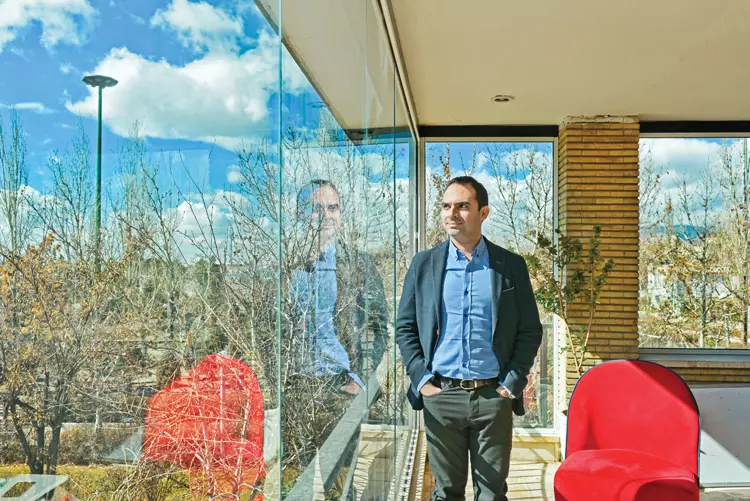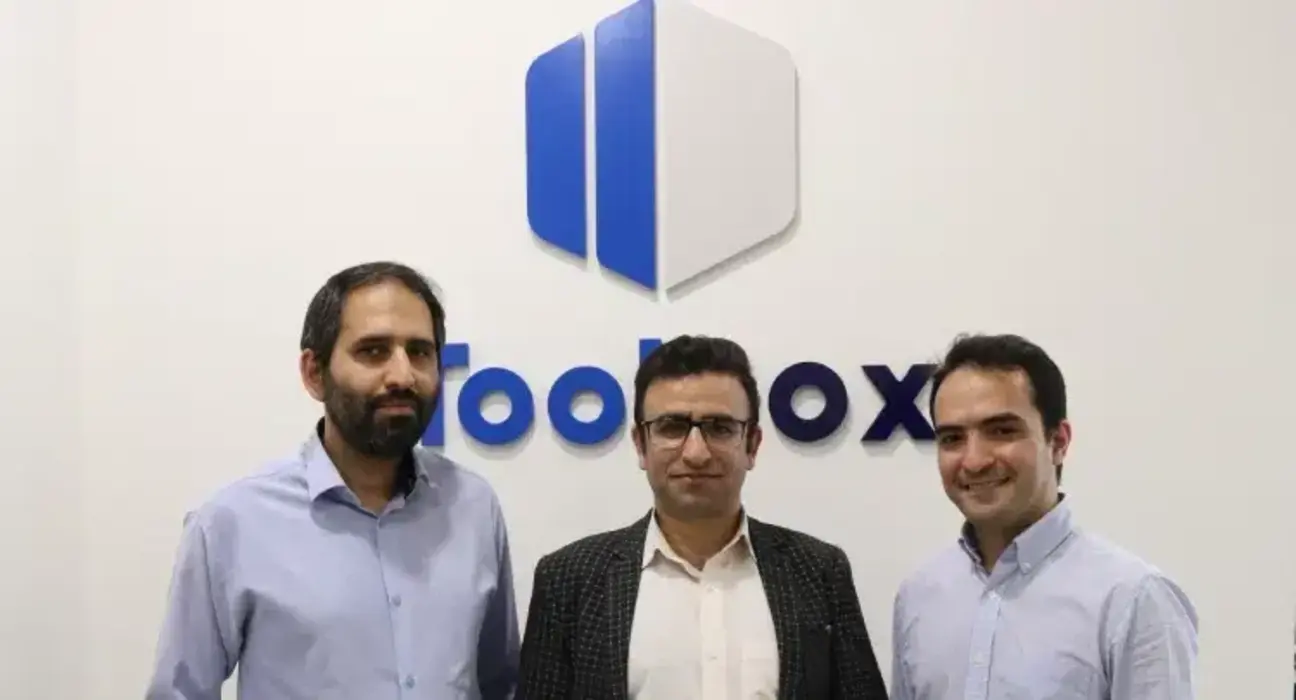Cold fever of FinTech!
We didn’t want to focus on disputes. But disputes are so many that we should pay attention to common things than disputes at first. We talked about fever of FinTech and wages.
Then it ended up with innovation and regulatory. Seyed Ebrahim Hosseini Nejad from Saman Electronic Payment, Ali HajiZadeh Moghaddam from Ertebate Farda, MohammadReza Jamali from Nabz Afzar, Ali Farmad from Hesabit and Reza Ghorbani from Rah Pardakht were present.
Ghorbani: the fever of FinTech startups is high. We can see it in two ways; one that there is a bubble and it’s growing or that good things are happening.
Other than the term “FinTech”, other terms like innovation and innovator are used in recent years and there are good happenings connected to these terms in the world; what is happening in Iran is that old things are being repeated and a series are new terms are being used.
FinTech is an interesting thing and many people see it as a money making industry and the reaction towards this field if like a temptation for opening a bank in last few years.
-
Mr. Farmad, you work in the FinTech startup environment, do you think that this environment isn’t bigger than what is advertised now?
Farmad: I think nothing important has happened and we can’t say that now the number of FinTech startups is very high. We didn’t have FinTech startup output in comparison to the news and disputes about FinTech.
Several things are gathered together and have created this bubble. One thing that may be the first spark is filtering some interface ports. In foreign environment many startups had been grown and gained a good share of the market.
These things had happened more outside Iran and more media here have addressed to this and these happenings made banks and payment companies feel that there is the space and they can use it or they predict that the same thing would happen in Iran as well.
Tousan started its work as the first company and then Informative service company entered. I think Tosen didn’t have any understanding about the market at first but little by little it improved.
Haji Zadeh Mogaddam: in Iran IT, there is money in several fields and there are a few big non-bank IT companies. IT in bank is very important and banks have expertise in mechanizing and computerizing and there are many small companies in this field because there is a better infrastructure in this field.
One topic named open innovation is the requirement for entering this field and I believe that there isn’t such an insight and it is copied.
We shouldn’t think that because many people go that way, thus we should do the same too. It is a need that each person should feel and then go forward.
It is possible that in some fields, closed innovation works better. In current situation there are people who have reached this insight and there are also people that think it is a movement which has become prevalent.
-
Ghorbani: why don’t we have startup FinTech that is prominent? For example in the field of E-Commerce, we have DigiKala and in the field of apps we have CafeBazaar but we don’t have any in FinTech and none of startups has grown so much but there are more disputes in this field compared to others.
HakiZadeh Mogaddam: it depends on your definition of FinTech. I should say that it is something new and none of them had the opportunity to grow but there are good non-payment and non-banking companies in FinTech that have grown and made money. For example companies that sell exchange to people.
-
Ghorbani: is their turn over to the extent that they can become recognized?
Farmad: if DigiKala has become big, we should see with whom it had competed. DigiKala works in the space of E-Commerce that has a different space and media.
Ghorbani: Mr. Hosseini Nejad, do you as a payment company feel that FinTech startups are your competitors?
Hosseini Nejad: no but if we look at it from the perspective of philosophy, because all of our economy and business is in a big anomaly, what Mr. Farmad says would happen.
I don’t know whether I’m a service provider to the seller or a transaction processor, usually companies like us should find their role themselves and keep it.
-
Ghorbani: like Visa and Master?
Hosseini Nejad: maybe a layer below them, but in Iran there are companies like us who think that why we should allocate service provision to the seller section to another person.
I think FinTechs are in a lower layer and take service from us and provide service in another part. Usually there are two insights in this section; one is income sharing or they wanted to take the PSPs as well.
I don’t say that all of them are like that but there is such a concern. According to the cooperation between us and some FinTechs, we came to this conclusion that the most important thing is to know who your audience and its mode.
For example, how it defines loyalty. FinTechs want to enter the upper layer and PSPs want to work in the lower domain. Here the important thing in the structure is wage.
Most companies who work in this field may think that we should give them money because they make transactions; but I say you have taken service from me and should pay its cost to me and you should make money from the space to where you have entered.
-
Ghorbani: you are a payment company, why did you gather some startups and small businesses?
Hosseini Nejad: I didn’t do so to say that they are under our umbrella. We believe that when startups have good thoughts, they become strong and we would improve as well.
In fact we offer them our facilities so that they can provide their service and attract customers. They have attracted many customers and make effort but in don’t think that any of them gain profit right now.
But I see that their mind frame is good, they make money correctly and their path is correct. We didn’t have any transactions with these companies that work with us, we have helped them but we didn’t pay any money for example for the transactions they made. It is possible that this model is good for one year but it can’t work for next five years.
-
Ghorbani: Mr. HajiZadeh Moghaddam, why did you come to startups? Because of open innovation idea or something else?
Haji Zadeh Moghaddam: we see that for example banks don’t write choirs themselves and telecommunication companies don’t want to develop BTS technology.
They look for some companies that can give them good infrastructure; like service company, even Tousan company in Iran wants to receive money from banks for transacions.
-
Ghorbani: Mr. Jamali! Can you give us a figure?
Jamali: in which field? In the field of banking and payment, this can be very big and I think there are 20.000 billion toman wage-based business activities each year that can happen in a space with for example up to 1200 billion tomans. These are incomes of companies that can work in this space.
Hosseini Nejad: I think FinTech should either facilitate an activity or add a market.
Jamali: we use a limited space right now. In fact there is a chain whose start is from issuing bank, Shetab and Shaparak and it reaches PSP.
If another part wants to be added to PSP, it would be like a person who is hanged from a helicopter and you want him to fall.
Now imagine a different space which is positive. Issuing bank has developed facilities for Shetab and takes 25-toman wage and the next person takes 50-toman wage.
A PSP for example Mr. Hossein Nejad can say that for example for each transaction I should pay an amount as a wage and this chain becomes a process. Transaction is a process.
There is a good space for us to have more complete processes and this space would exist when the first chain becomes corrected or when we try to make this chain positive; in fact we should think of money making.
If not, there would be a small space that can’t be developed and in the end it would become a side effect of a system; for example profit rate increases or banks become close to bankruptcy.
These spaces and businesses from payment companies to Shaparak are developed so that banks become exempted from these tasks and less people refer to banks, their costs decreases and they can be expanded.
Now if this topic becomes a barrier itself, there would be no excuse. I believe that we should first think of its philosophy. We should see that what the philosophy of FinTech is and what it’s going to do. In general what is the philosophy of many of these companies that work in the field of IT?
Farmad: doing what banks don’t do.
-
Ghorbani: in general what do FinTech startups do that companies don’t?
Jamali: I don’t even believe in that.
Farmad: a series of tasks whose main topic would be facilitation. In fact these small companies whose speed is more than banks and big systems, could do a series of works that were market needs much faster and create facilitation.
For example if a bank wanted to draft from one country to another, these startups could do it faster and they took less wages in order to gain a bigger share of the market. These led to market needs being met and they could take the market.
-
Ghorbani: the main philosophy of FinTech startups is innovation and creation. Mr. Jamali points to wage and that everyone receives wage and adds some amount of money to it and has a reasonable logic. When we don’t have wage in Iran, how can we act quicker?
Farmad: we receive wage from our customers and none of the startups provide service for free.
HajiZadeh Moghaddam: some think that we should be partner with bank and PSP and get a share from recession of money.
Farmad: at first a startup should have grown to the extent that it can enter the stage of bargaining. Fortunately, I haven’t seen that someone works for free, because the market isn’t a supportive one and there is no bank that opens a company and supports it.
If you can’t make money and get a share of the market, you would be automatically removed because there is no support. For example there isn’t anybody who gives you money and tells you to be only FinTech.
Ghorbani: you as FinTech startup company do what payment companies had done during their early work. Right now these companies receive wage from acceptor but they received it from end user in the past.
Hosseini Nejad: we have a theory in financial economy that is if you give food made for a twenty-year-old person, to a two-year-old child he won’t grow; he would explode or die. This has happened among PSPs and now each decision made would have bad consequences for this child.
In 1388 or 1389, we received 250 million tomans per month as wage and in that case we could make money for the costs. I say the philosophy of doing a thing is not followed because Central Bank issues a rule but someone comes and breaches the rule because these isn’t any regulatory tool.
For example PSP received wage and tried its best to bring it to a good level, but someone comes and receives no wage because it has got the whole market. Here failure would happen.
Thus I consider myself eligible to work in the field of FinTech. Because when I enter this field, the customer recognizes me very quickly and says “if you are a bank, you should give me something” but when a person like Farmad enters this field who has a business which should grow, they can cope with each other.
Thus I shouldn’t enter because I would ruin others’ work. Now that two-year-old child has become 11 years old but he has the size of a 30-year-old person and he need food.
Meanwhile, he makes no money from its productivity, he doesn’t work himself and receives pocket money, thus if he is left he would be destroyed.
We should take care of him. Therefore when we talk about wage, I become more nervous. Because someone else has made a mistake and brought up a child who eats like a 30-year-old person and has no skill.
Now I ask myself why we did this and we should come back with a correct mechanism. This issue exists in the field of FinTech.
Also big companies can’t think section to section. If they do so, their expenses would rise but a FinTech can work for one or two special section.
Big companies can use this as a big merit and support like the past; that is they pay attention not to be hurt and challenge them as well.
In fact they can take the market through FinTechs. There would be no concern if these things come together in a structured manner.
Ghorbani: when we talk about innovation, we can think of it in two ways; innovation is the result of improvement of performance and the other thought is that we change the whole thing which is named disruptive innovation. When we talk about innovation, all people think about the first definition.
For example DigiKala is a disruptive innovation compared to sellers of home appliance. In banking space, when we talk about innovation, we mean the innovation which change the whole thing.
Jamali: but it is in contrary to the nature of bank.
-
Ghorbani: should bank be innovative?
Jamali: innovation is a risk. In the world, it was not allowed to maximize profit rate and there were no wage. There is a minimized wage defined for wage that is one can not receive a wage lower than a defined amount.
On the other hand, they define a minimized amount for profit rate. These become principles and foundation of a project and in this way banks would remain stable and competitive space wouldn’t ruin them.
Farmad: among PSPs this has happened that they removed wage because of competition.
Jamali: for example, I use 100 tomans as the base and the market would balance itself in this way. For example, it is possible that no one can keep it on 100 tomans and change it to 120 tomans.
Farmad: if you can’t create any value, no one would receive a service from you. In the field of banking especially in Iran, there is a monopoly and it’s not that if I want to provide banking service or open a bank, I can do it easily.
When you become a bank, in fact you become an option for customers so that they can do their banking tasks. The more the options, the competition would increase. That financial tool exists for all these.
Bank still can create money and credit that it wants but in the infrastructure that startups exist, there is no such a thing. If you don’t create value, no one would get a service from you.
-
Ghorbani: Mr. HajiZadeh do you think that banks should be innovative?
HajiZadeh Moghaddam: the innovation I talked about earlier, happens within the organization. Disruptive innovations is something different and no one disrupts itself. For example PayPal or Landing Club are not for any bank and even banks closed Landing Club.
Regulatory tries to keep the same situation so that it can manage the risks. These disruptive innovations don’t come from banks and in fact their relation is conflictive but now banks are looking for their classic innovation; R&D is no longer innovative.
R&D unit can not be effective if it is closed for many businesses. you can have R&D but it should be open from both sides.
-
Ghorbani: banks should have innovation in their products.
HajiZadeh Moghaddam: one day Paykan automobile was enough but now it isn’t and it needs more personalization and we can not be responsive to customers with only one product thus because product situation is very complicated, banks don’t have another option.
Gorbani: innovation has been small from 1900 to 2017 and it has been improvement of performance. In financial industry, banking and other parts they have paid attention to improvement of performance.
Something may happen to change the base of all these things, like DigiKala that has changed retail selling from the base. Its nature hasn’t changed but all things have been changed and some people lose their jobs.
Jamali: I don’t agree that some people would lose their jobs. Maybe their position would change.
Ghorbani: this is happening and we can’t ignore it. We can consider the average lifetime of a business as well. Once a business would be founded and run for hundred years. Now there are jobs that are being removed after 50 years like Taxi Agencies.
Jamali: they wouldn’t be destroyed. For example, I don’t use Snapp in the morning because Snapp drivers have a general insight about Tehran map but drivers of taxi agencies use the best route.
I think life is all about service. Which services I receive in this country? One person in another part of the country may receive service but I may receive a limited number of services in Iran.
Maybe that person can live in different ways with thousand dollars but I may not live with 5 million tomans. I live in a place where my service is nothing but process. Now what does FinTech or a startup do? It makes a process which facilitates life and I’m ready to pay for it.
It makes a potential difference between current and future situation. This potential difference leads to a business and I pay for it.
In the banking space, innovation moves along its pathway, innovation in FinTech moves along its pathway too. No one is in contrast with another.
Hosseini Nejad: when did the form of banks in Iran change? From the time Internet came and in fact banks used another network. Thus innovation wasn’t in banking, but it was in another section that was used in banking.
Another movement would come in the future and anyone who can move a business to that paradigm, would be a disruptive innovation.
Ghorbani: innovation is in the improvement of performance but there is a thing about disruptive innovation we should talk about which change everything.
I want to know if this is vain or I’m talking about a topic that is banking in another way like PayPal and Stripe.
Farmad: this didn’t happen now and maybe no startup would be the competitor of banks. In this payment field where there is a series of tools, regulator or even those companies don’t let you move.
You have problem but this space becomes more open and several banks can provide some banking service to startups, these can enter this space and they would certainly enter.
In other part of the world, they have entered. In other parts of the world, regulator has problem with this innovation development process.
In fact all people in our country should receive better service, thus it doesn’t matter either banks or startups provide such service, in the end people and this economy should make the best value added.
Here startups enter and make this competitive space and here banks worry about that whether we should buy startup or close them and etc. this didn’t happen here because this competition hasn’t formed here yet.
There are a series of banks that are aware of these happenings in the future, on the other hand many of them think that because one person has done this so we should do it too.
HajiZadeh Moghadam: we shouldn’t consider startups as a person who has been tagged. The concept did exist. In Exchange, several years ago small companies came and worked in open API infrastructure of Exchange market.
Exchange exceeded from banks and its economic model was completely clear and they knew that people pay such an amount of money to receive s service and they provided interesting products for investment.
This has happened in the field of banking and now they try to curb interest-free funds which challenge banks.
-
Hosseini Nejad: what is the danger? Why are banks and central bank concerned?
HajiZadeh Moghaddam: central bank has the right to concern because it has no control over it and can’t apply its financial policies and it should make them systematic and it did so. They are told to have one branch.
For example, Landing Club couldn’t give license from bank regulatory, thus it received its license from the regulatory of consumer rights support. Thus we can say that disruptive innovation has happened in the field of banking and now it’s working.
-
Ghorbani: all startups over the world have formed one percent of banking and payment. People trust banks and branches but what do FinTech startups have to be trusted?
Farmad: all these structures are changing. For example, once people said they wouldn’t buy a cloth until they tried it but now many people buy their clothes online. This generation has changed.
Many people didn’t buy digital products of DigiKala but now they buy many of its products. This trust has been made over time. It was the same for banks and people trusted banks little by little.
Ghorbani: you say people’s culture changes little by little and they would trust FinTech startups that don’t have any big building.
Hosseini Nejad: let the market and consumer decide about this issue. Places like interest-free funds have found a path for making money. These funds have counted on my greed and for example tell me that bank would give you 20% but I give 30% or they have counted on my need.
They have certainly counted on something to survive. In the end, because our whole economic model is abnormal, one should pay attention to weird thefts. If all things were ok, inflation rate wouldn’t become 40% and value rate of money wouldn’t be 50%.
The inflation rate would remain 2% and the value would be 4% or 5%. In this case credit cards would become valuable.
Ghorbani: can Snapp be considered a competitor for banks? It can’t offer loan but collecting many sources is possible for it.
Farmad: it happens in the ill economy, as banks did. If it happens, it’s ok. The company could collect 48 billion dollars in China. Which Iranian bank has 48 billion dollars now?
I think value of Snapp is related to its name and its value is much more than the money it earns provided that it is formed in a healthy environment.
Necessity of having a regulatory at this level is something different. I think that regulator should be in some places and do its duties. Now regulator doesn’t do a series of tasks it should do.
-
Ghorbani: what should regulator do in relation of FinTech startups?
Farmad: it shouldn’t do anything.
HajiZadeh Moghaddam: regulator should pay attention. One positive point is that their task is easy because whatever happens in these fields, has happened before in the world unless it is a very domestic one.
For example, these interest-free funds are a special domestic topic of our country and our regulators should have domestic innovation for examining them, but in fields like FinTech and payment there is no need to do unusual things.
You should see how others had solved problems and solve it in a way that the need being met.
Farmad: all people talk about supporting FinTech startups. FinTech doesn’t need any support. No startup needs support. The startup would find its market itself and if it can, it would survive otherwise it would fail and it knows this culture.
For example development center has provided a document with which central bank doesn’t agree but its representative has signed it. Now this document is prepared and we can ask anybody in this field about it.
Who has acted to his promise among those who told that they would support FinTech? This market is moving forward correctly. Those who gather together to create startup, can hold the market or they would receive nothing.
In our country, no one would invest on you until they make sure that you earn money. In this environment what do you want to support? Especially from regulatory.
Regulatory is not familiar with this environment. For example, there is a condition in this document that is not consistent with 90 percent of this field.
So why they hurry for making rules. They should let this trend moves forward a little bit and the regulator becomes familiar with that, then do something if necessary.
Now which FinTech startups has made mistake? According to statistics, networks like Instagram has 3 percent criminal content; that is we have had control over the whole Instagram for this 3 percent.
It is possible that this percentage is very small in FinTech startups thus based on which risk, there is such sensitivity?
Jamali: something has happened that has raised this sensitivity.
-
Farmad: yes but they have applied this sensitivity to the whole market. Which one has breached more, banks or FinTech startups? Central bank or banks?
Jamali: I agree with regulator supervision.
Farmad: no one is against supervision. Supervision is different from avoiding something so that one thing doesn’t happen.
Jamali: regulator supervises a series of common things. Suppose that communication is in a way that I want to give wallet on mobile. If I give up to 20.000 tomans to each one, the total amount would be thousand billion tomans and this is one percent of the total cash volume.
If this is supervised by central bank and these are special accounts, no problem would occur but if this amount reaches 30 percent, problems would arise.
For example, in the field of institutions, there was no supervision and suddenly a project like Padideh came and affected the whole cash volume that was 94.000 billion tomans.
Now Snapp has come and I use it. I have 200.000-toman-credit in it. There should be a limitation for it so that it doesn’t exceed from a determined number.
About a meeting
We wanted to hold a meeting with the topic of FinTech. This week we would talk about this topic; one is the event of financing Sharif University and the other is Web Festival. That in sections other than banking, they have paid attention to FinTech means that FinTech has exceeded from banking space.
FinTech has become interesting for other sections as well. We could gather more startup activist for this meeting. But according to the cold fever of FinTech, we preferred to have people from different fields.
This has made things difficult for photographers. All the participants were neither startup young people nor managers of big companies.
These days, when some people related to banking and payment gather together, they usually talk about Iran payment event.
No one is happy about the delay of this event and all are sad that we put sanction ourselves. It really hurts that someone ignores national benefit for his personal short term benefit.
Before anyone arrived, we talked to Mohammad Reza Jamali. He was trying to get a loan for knowledge-based companied. His saying is not related to FinTech but knowing about this experience is important for all people.
Jamali said he came to this conclusion that business is about doing all there unrelated tasks. We should reach to important tasks among tasks related to insurance and tax.
Seyed Ibrahim Hosseini Nejad
Seyed Ibrahim Hosseini Nejad is born in 1351; CEO of Saman Electronic Payment (SEP) company, one of the famous figures in Iran Electronic Payment industry.
He has B.S. in Chemistry Engineering from Khaje Nasir and M.A. in MBA. Hosseini Nejad started working in SEP as the manager of planning and study.
Ali HajiZadeh Moghaddam
He got his B.S. and M.S. in computer engineering respectively from Amir Kabir and Sharif University. He is teacher and advisor of Scram and Chabok development.
He has the experience of working and managing in Saman and Ayandeh banks and Ertebate Farda company and had a role in launching AksPrint and Bahamta startups, Finova accelerator and Baz FinoTech banking infrastructure. Now he is the director of Adanik company.
MohammadReza Jamali
He is graduated from Amir Kabir University in computer engineering and got his M.S. in artificial intelligence from Shiraz and PHD in machine intelligence and robotics from Tehran University.
He has worked professionally in Tousan Company, Aerospace organization and he was a faculty member of Shahid Rajaii University from 1379 to 1390. From 1390 up to present he was CEO of NabzAfzar company and he is working in the field of measuring the quality of IT infrastructure.
Ali Farmad
He is born in 1360s and has studied management. He has worked in the field of internet businesses for about 10 years. He started his work with web design and now he is the senior programmer and product manager.
He has launched many startups and it’s about a year that has started a startup in the field of FinTech named Hesabit which is the online invoice service and makes internet payment of invoices possible. Monthly FinTech startups event named FinTalk is another activity.
Reza Ghorbani
He has studied Chemistry Engineering from Sharif and media management from Tehran. he has worked in places like Javan Hamshahri and other magazines of Hamshahri Group, Sharif newspaper, JameJam, Asre Ertebatat, Modiriate Ertebatat, Peyvast and Shanbe.
From Ordibehesht 2rd 1390, he has launched RahPardakht network. He cooperated in production of books like bank 3.0, virtual banking, digital bank and break of banks in the media group of Shafagh.















Post Comment